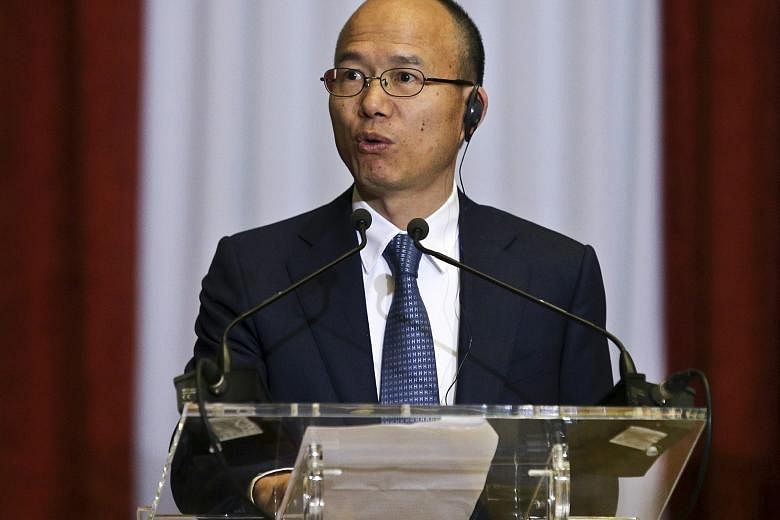Keeping the extremes of yin and yang in balance is a philosophy that Chinese billionaire and professed taiji devotee Guo Guangchang has always subscribed to.
But that balance - between appeasing China's communist political elite and tapping an increasingly market-led economy that has made him one of the country's wealthiest men - seemed to have been thrown off-kilter recently.
Earlier this month, local media reported that the founder and chairman of Fosun Group had gone missing. His firm later said he was assisting the authorities with a probe, without elaborating, sparking speculation that he might be implicated in President Xi Jinping's anti-graft drive.
Last Monday, four days after his reported disappearance, he turned up at Fosun's annual meeting and has since been reported to have returned home. The mysterious probe, however, has led to fears that the private sector could be the next target in the anti-corruption campaign, which has so far netted mainly powerful officials.
Fosun, which owns the Club Med chain and has a stake in Canada's Cirque du Soleil, is one of China's biggest private conglomerates.
Mr Guo was born in the small farming town of Hengdian in eastern Zhejiang province in 1967, during the early days of the Cultural Revolution. Those were tough times for his family, who lived on rice and sun-dried pickle called meigancai. His mother had to plant sweet potatoes secretly to feed the family, he has said in interviews.
At 18, he received a government bursary to attend Shanghai's Fudan University, where he developed an interest in philosophy as China was becoming more open to Western ideology.
But even then, the young man was showing his entrepreneurial streak. Twice a week, as his classmates finished studying at about 11pm, he would go door to door selling bread to hungry students in the university's dormitories.
Though he earned only five yuan (about S$1) each time, the money helped cover his monthly expenses of about 30 yuan.
After graduating, he worked at the university's Communist Party Youth League for three years before setting up his own market research firm in 1992, the same year paramount leader Deng Xiaoping launched economic reforms that called on the non-state-owned economy to prosper.
Together with a few classmates, Mr Guo set up Guangxin Technology Development with money he had originally set aside to fund his overseas education.
"That was an era full of opportunities and enthusiasm," he was quoted as saying in the Shanghai Daily. "Young people were inspired by the call of Comrade Deng Xiaoping, it felt like a burning fire in our blood."
Guangxin later became Fosun, a name change that reflects how much Mr Guo - now said to be worth US$5.7 billion (S$8 billion) - cherishes his education. Fosun means "star of Fudan", and even today still hires many Fudan graduates in an unwritten tradition.
It is said that the company quickly gained traction because one of its co-founders, computer science student Tan Jian, whom Mr Guo married, had family connections with government officials, according to a South China Morning Post report. The couple later divorced.
Ms Tan's father, a respected scholar, served as a key stepping stone by helping the firm gain access to the advanced pharmaceutical industry, little known then to many other firms. It gave Fosun first-mover advantage, allowing it to secure deals others could barely touch.
The company's first break came in 1993 when it made 100 million yuan selling a diagnostic kit for hepatitis antibodies, with research help from Fudan, according to Bloomberg.
As his business grew, Mr Guo started looking further afield. The company bought financial firms overseas, such as insurers, to secure long-term funding for investing in consumer brands and other businesses, borrowing a model used by American investor Warren Buffett, whom Mr Guo often cites as an inspiration.
Fosun's first global deal came in June 2010, when the firm paid €41 million (S$63 million) for a stake in Club Med, before winning a controlling stake earlier this year.
It has since amassed holdings in a range of firms, including Portuguese insurance group Caixa Seguros and high-end Italian suit-maker Raffaele Caruso. The One Chase Manhattan Plaza in New York also sits snugly under its belt in a US$725 million purchase in December 2013.
Despite his successes, Mr Guo - now married with three children to Ms Wang Jinyuan, a well-known Shanghai television anchor - is often described as an introvert and does not fit the vain stereotype of some newly minted billionaires.
A mixture of Buddhism, Taoism, Confucianism and "Buffettism" makes him tick, he revealed in an interview with Financial Times (FT) last year.
So does taiji, which he practises just a couple of times a week because of his busy schedule. He has been known to break into spontaneous taiji at coffee breaks during tough deal-making sessions, according to the FT report.

